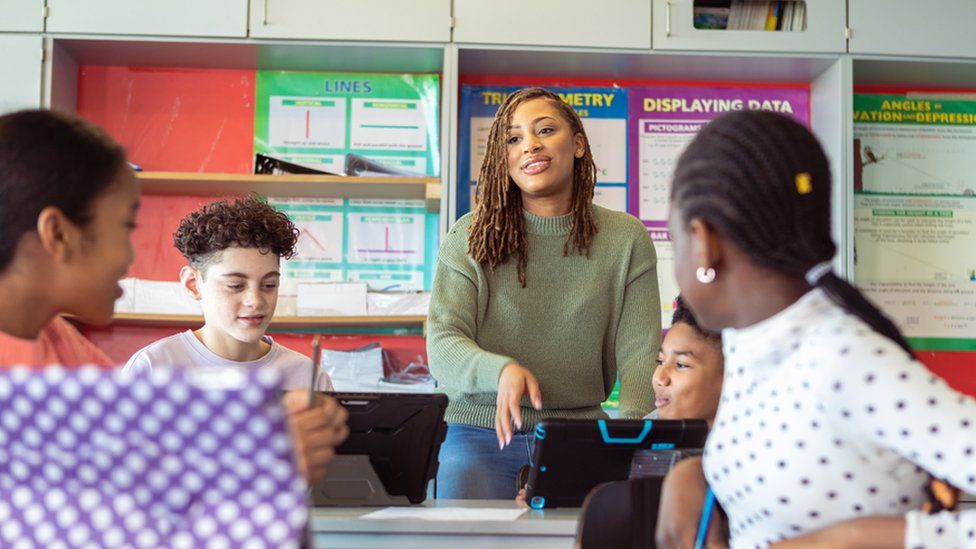RSHE and RSE: What are children learning in sex education?
- Published

Guidance for schools in England on how to teach children about sex and relationships is due to be updated by the government.
Some MPs and parents have voiced concerns that children are being exposed to "inappropriate" content, but a head teachers' union has said there is no evidence of a widespread problem.
Why are RSHE lessons controversial?
Schools say they consult with parents and the community on relationships, sex and health education (RSHE) teaching.
One of the biggest divides is about whether schools overstep boundaries in what is being taught, and whether it is age-appropriate.
There were protests across England in 2019, after the government said teaching about relationships and LGBT equality would become compulsory.
In 2023, protesters outside a school in Manchester said children were being sexualised, and called for LGBT material to be withdrawn from the curriculum.
More than 50 Conservative MPs wrote to the prime minister in 2023, claiming children were "being indoctrinated with radical and unevidenced ideologies about sex and gender".
The MP behind the letter, Miriam Cates, called on Rishi Sunak to commission an independent inquiry to "end inappropriate sex education".
In response, the prime minister brought forward a review of RSHE statutory guidance. A review was already due before the end of 2023.
The head teachers' union, NAHT, said there was no evidence of age-inappropriate content being a widespread problem. It expressed concern that the review was "politically motivated".
Another area of contention is how third-party groups are used to teach RSHE.
Schools are free to decide how to deliver RSHE, and outside organisations sometimes brought in to give workshops.
What does RSHE mean and what is taught in sex education?
RSHE stands for relationships, sex and health education.
Throughout primary school, children are taught about healthy, respectful relationships, focusing on family and friendships - including online and social media.
Children also learn about physical health, parts of the body, boundaries and puberty.
The government strongly encourages schools to include teaching about different types of family and same-sex relationships.
At secondary school, relationships and sex education covers content on a wider range of key topics.
It includes sex, sexual relationships, consent, online abuse, domestic abuse and female genital mutilation (FGM).
Do schools have to teach RSHE?
It is mandatory for RSHE to be taught in all secondary schools in England.
Primary schools must cover relationships and health education, but they can choose whether or not to cover sex education.
Most schools deliver RSHE as part of the wider school timetable - in form-time, assemblies, science classes and workshops.
Guidelines state that the religious background of all pupils must be taken into account, so that topics are appropriately handled.
The RSHE curriculum is reviewed by Ofsted at school inspections.
Can parents see what's taught in RSHE?
Yes.
In October 2023, Education Secretary Gillian Keegan wrote to all schools in England to remind them of their duty to share RSHE materials with parents when asked.
The letter came after a tribunal issued a ruling that declined a parent's request to have the material from an RSHE lesson by an external provider called the School of Sexuality.
Can parents remove their child from RSHE classes?
In some cases, yes.
Parents have a right to remove their child from some sex education lessons, but not from relationships education.
They can speak to the school about concerns, but do not have a right to change parts of the curriculum they may not agree with.
How is RSHE and RSE taught in Northern Ireland, Wales and Scotland?
Northern Ireland
Relationships and sexuality education (RSE) is mandatory for all pupils. Each school develops its own RSE policy in line with the school's ethos.
In secondary schools, a parent can remove a pupil from sessions covering sexual health and the prevention of early pregnancy and access to abortion.
Other RSE lessons are mandatory.
Wales
RSE is a mandatory part of the curriculum since 2022.
Guidance to schools sets out which "developmentally-appropriate" topics should be covered from age three to 16.
A legal challenge to RSE by a group of parents was rejected in the High Court in 2022.
Scotland
Local authorities are responsible for the delivery of relationships, sexual health and parenthood (RSHP) education in schools.
Parents and carers are allowed to to view key teaching materials, and can withdraw their children from the sexual health elements of RSHP education.
The Scottish government is in the process of finalising updated guidance, after a public consultation in 2023.
Related Topics
- Published6 June 2023
- Published22 December 2022
- Published8 August 2023
- Published24 October 2023
- Published26 November 2019